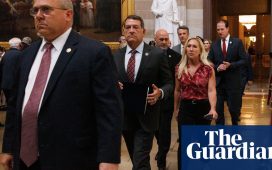The Trump administration is putting the health and potentially lives of thousands of federal judges, lawyers, court staff and undocumented immigrants and their families at risk by insisting that immigration courts remain open for the deportation hearings of detained immigrants, despite the threat of coronavirus.
On Wednesday the Department of Justice announced the temporary closure of 10 immigration courts in addition to the already shuttered location in Seattle. All deportation hearings relating to undocumented people who are not in custody have also been suspended.
But a rare alliance of federal employees including immigration judges, Ice prosecutors and lawyers representing immigrants are saying the changes are too little, too late. With 58 immigration courts still open across the country, and only 11 closed, the prospect of courthouses acting as incubators and disseminators of the virus remains pronounced, with the risk of spreading the disease to large numbers of federal employees and the public.
A judge working out of the immigration court in Denver, Colorado, is understood to have contracted Covid-19. The Denver court is one of the 58 ordered to remain open.
Judge Samuel, communications director of the National Association of Immigration Judges (NAIJ), told the Guardian that the new restrictions were helpful but not enough. “There are still hearings going on across the country in courts that need to be closed because they are a public safety hazard.”
Staff in federal courts have been making increasingly desperate appeals to the Trump administration to abide by the guidelines set by its own disease control agency and temporarily close all immigration courts. But they have repeatedly been told that hearings must continue.
It appears that amid the crisis over the coronavirus pandemic, Donald Trump is putting his desire to stand tough on immigration in an election year ahead of protecting the lives of government workers and the public. The instruction to keep going with immigration removal hearings of detained individuals issued by the DoJ has come from the top of the Trump administration, court employees have been told.
Yet the approach directly conflicts with the guidance given by the government’s own disease control agency. Latest advice from the Centers for Disease Control and Prevention (CDC) says that individuals at risk of severe illness if they contract Covid-19 should avoid gatherings of 10 or more people. It also says that workplaces should “encourage staff to telework”.
Yet deportation hearings for detained immigrants which frequently have 15 or so people holed up in closed-air courtrooms for several hours, must now carry on.
“Prioritizing politics above all else is incompatible with the principles of due process and is a danger to the health and security of all involved,” Judge Ashley Tabaddor, president of the NAIJ, said before the new restrictions came into effect.
Among the 10 courts that have been closed are three located in New York City that are among the busiest in the country. Court staff have been trying for days to persuade management to let them telework from home in line with CDC advice.
A whistleblower working in the New York City immigration courts has shared with the Guardian details of how basic CDC guidelines have been flouted every day in the city’s three immigration courts. Even after the announcement was made on Wednesday that the courts were closing, federal staff were told that they had to come into work for the rest of the week to “assist with an orderly shutdown”.
The whistleblower said they were relieved the courts were being shuttered but they remained angry at how the issue has been handled. “At every turn when we brought up our concerns, management has downplayed and deflected responsibility. We could have been exposed for days, even weeks.”
They added: “There is no other reasonable explanation to risk these many people’s lives other than that the Trump administration hates immigrants so much they want to get rid of them. That is abhorrent to me.”
In recent days members of the public have been showing up at the New York courts looking visibly unwell. Yet only the most basic hygiene measures have been taken, the whistleblower said.
Security guards have been instructed to wipe surfaces clean in courtrooms and waiting rooms where suspected coronavirus cases have been present. “That’s the extent of the deep-cleaning of immigration courts,” the whistleblower said.
Around the country, courts that must remain open to hear detained deportation cases are already experiencing shortages of cleaning supplies to sanitize courtrooms forcing federal employees to provide their own. Interpreters needed to translate for immigrants in removal hearings were being flown from high-risk areas where Covid-19 is already prevalent such as New York to less at-risk states, thereby potentially spreading the disease.
“That contradicts everything we are being told by health experts and the CDC,” said Judge Amiena Khan, NAIJ’s executive vice-president. “How in God’s name is flying interpreters around the country helping to combat this global pandemic?”
Earlier this week the unions and professional bodies of immigration judges, Ice prosecutors and lawyers representing undocumented clients issued a joint statement calling for the immediate suspension for up to a month of all of the nation’s 68 immigration courts. The groups called the measures taken so far “woefully insufficient … The DOJ is failing to meet its obligations to ensure a safe and healthy environment within our immigration courts.”
Federal employees are being asked to make unconscionable choices, as illustrated by the battles waged in the New York courts. The whistleblower personally has a respiratory condition that means that were they to contract the virus they could be in mortal danger.
Numerous requests to telework from home had been turned down, forcing the whistleblower to travel into court every day on the New York subway – a perilous exercise in itself. Yet they feel unable to disobey because if they lost their job they would also lose healthcare coverage which would make them all the more vulnerable.
“The choice that all of us federal employees are being presented is you come to work and you get healthcare coverage or you start taking days off and your supervisor doesn’t like it and you risk being fired without healthcare coverage,” they said.






